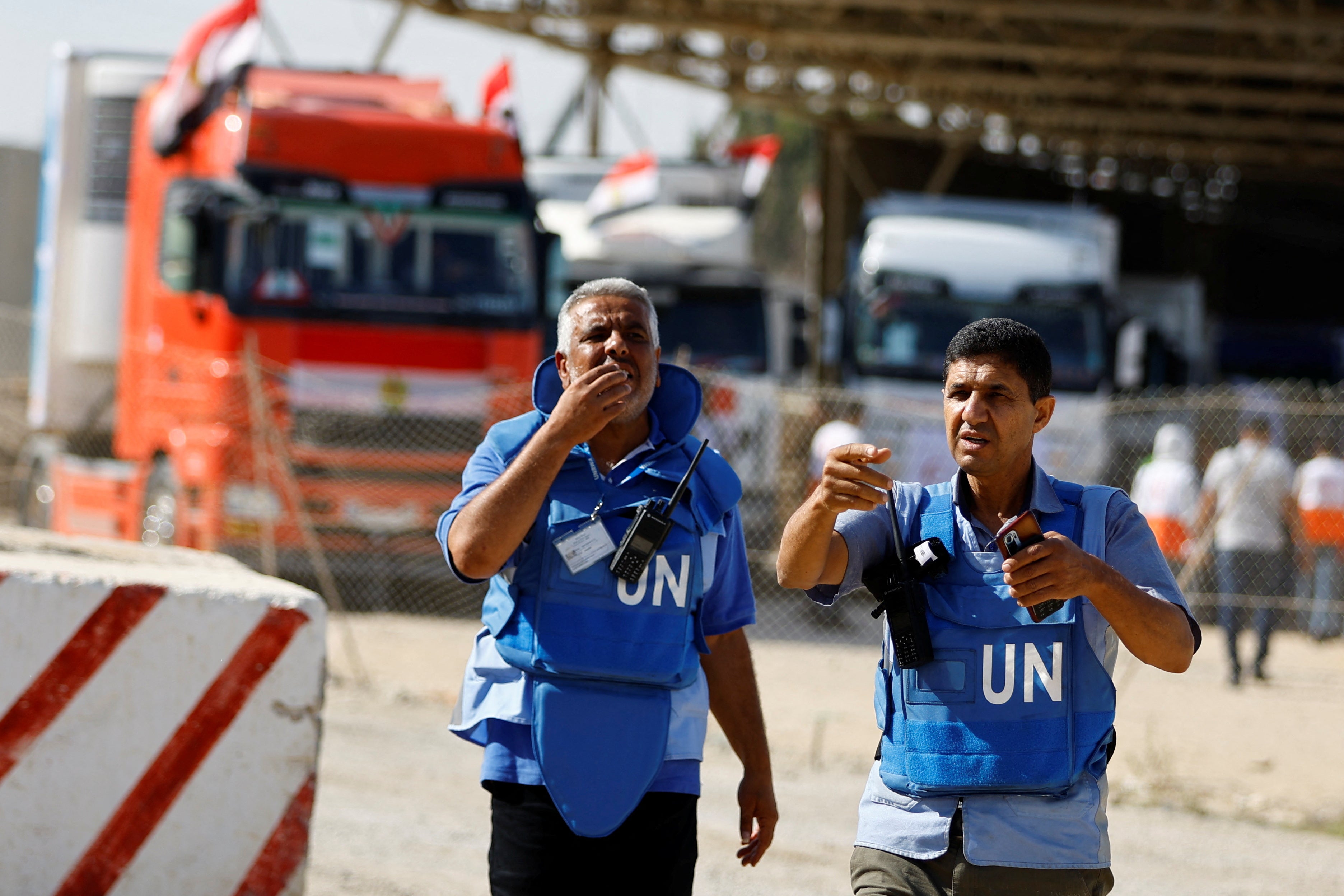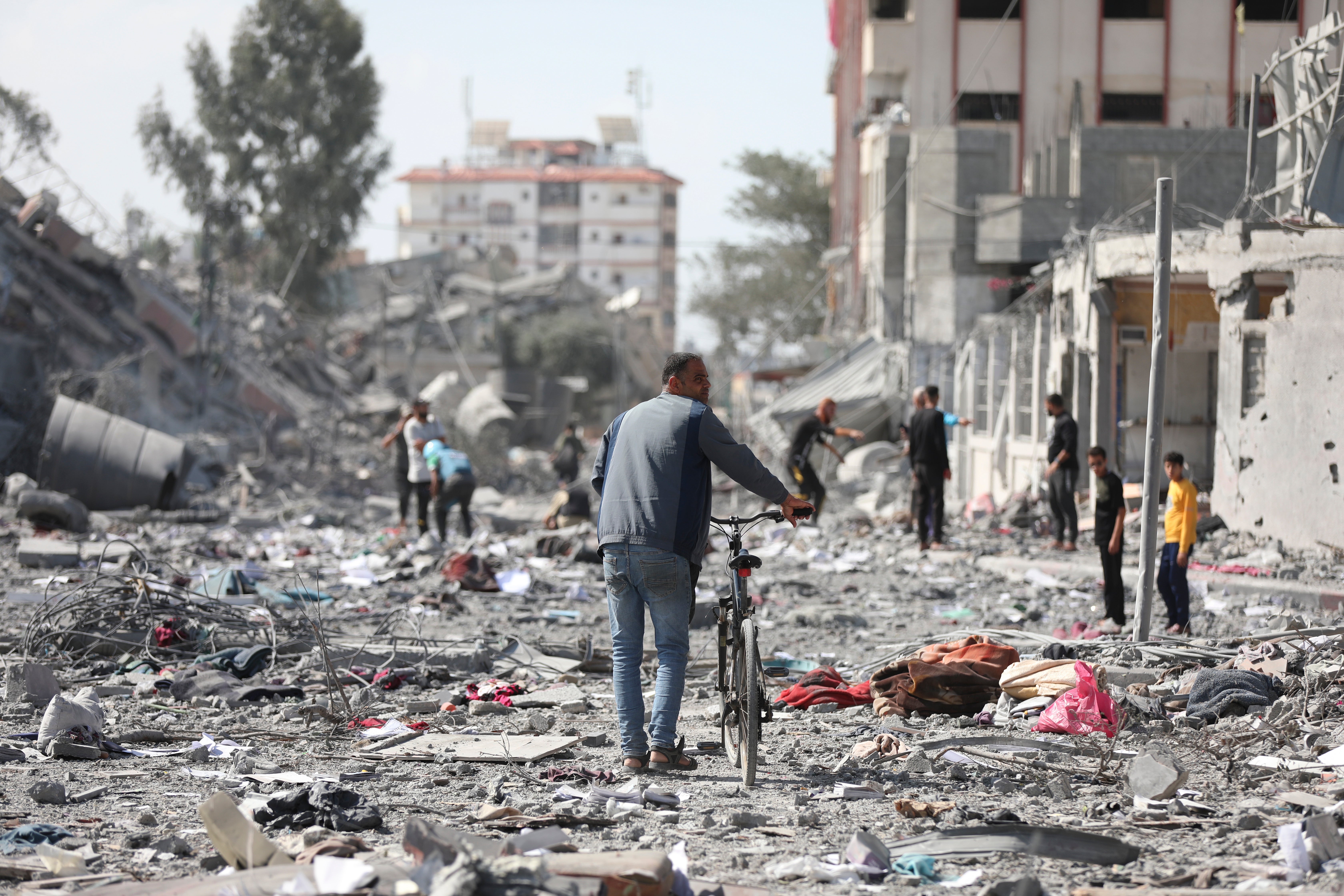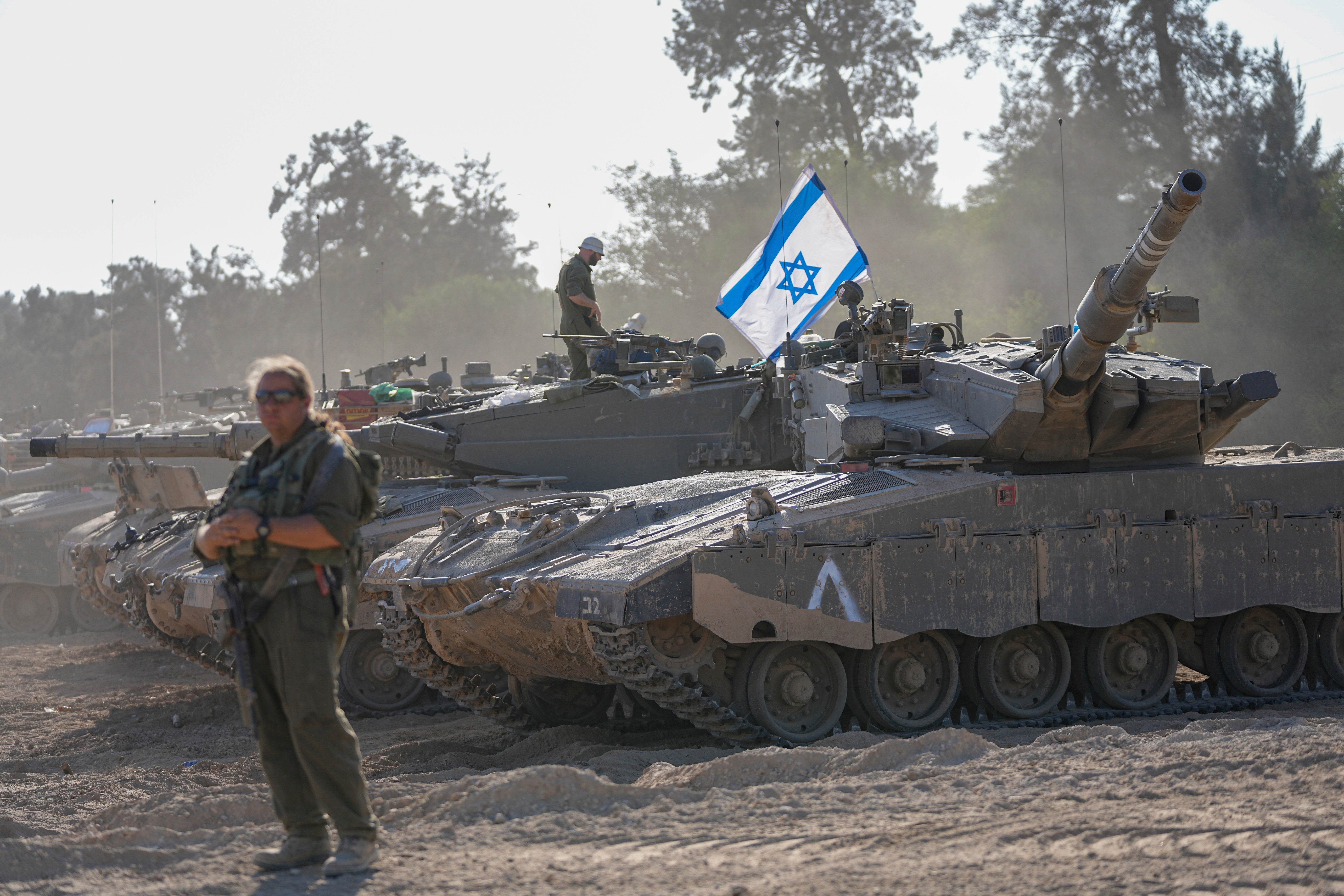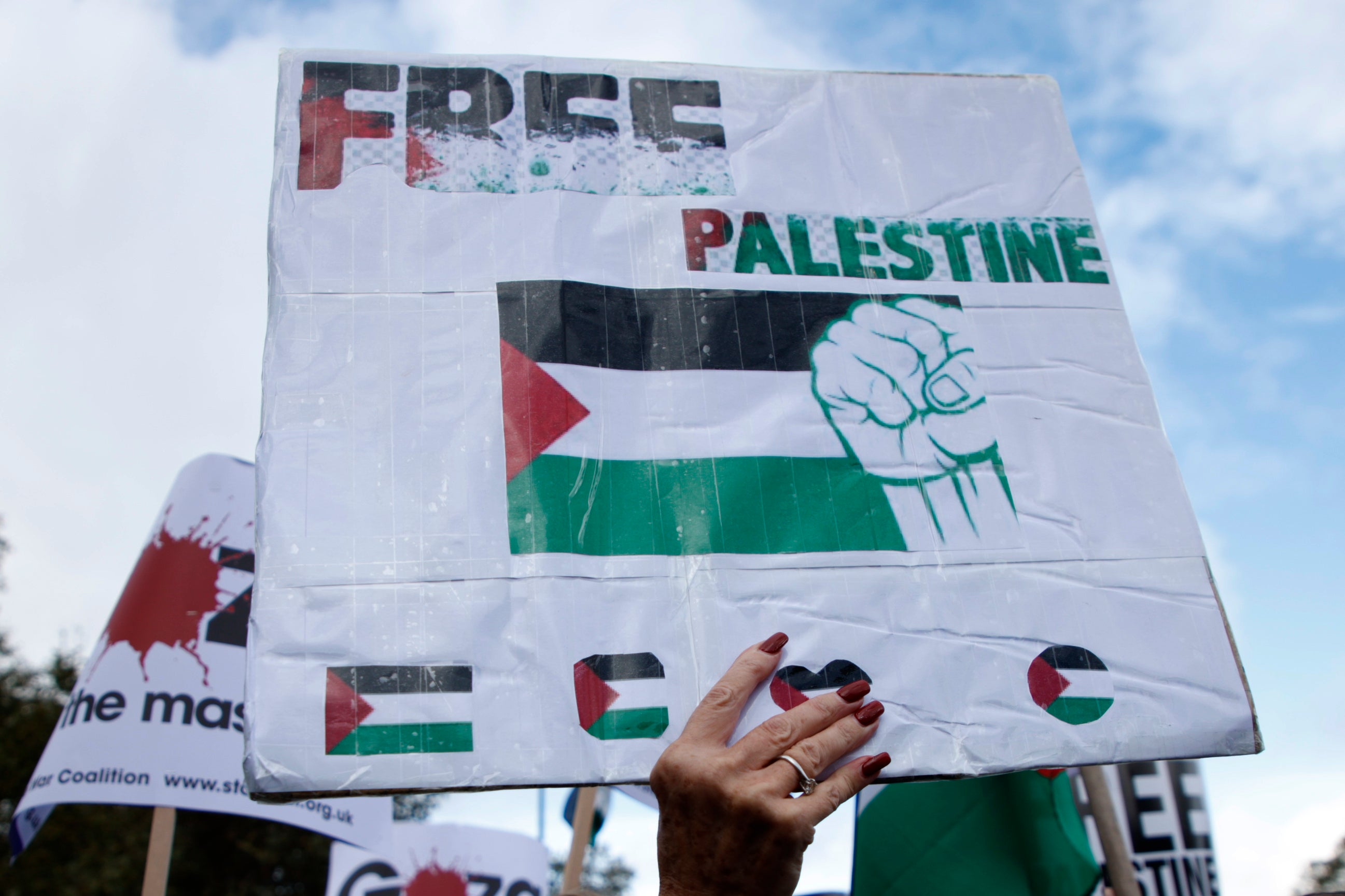Trucks carrying aid and coffins enter Gaza for first time as Rafah crossing opens
UN says 20 lorries crossing Egypt border are ‘drop in the ocean’ as Unicef warns delivery of water is ‘matter of life or death’
Your support helps us to tell the story
From reproductive rights to climate change to Big Tech, The Independent is on the ground when the story is developing. Whether it's investigating the financials of Elon Musk's pro-Trump PAC or producing our latest documentary, 'The A Word', which shines a light on the American women fighting for reproductive rights, we know how important it is to parse out the facts from the messaging.
At such a critical moment in US history, we need reporters on the ground. Your donation allows us to keep sending journalists to speak to both sides of the story.
The Independent is trusted by Americans across the entire political spectrum. And unlike many other quality news outlets, we choose not to lock Americans out of our reporting and analysis with paywalls. We believe quality journalism should be available to everyone, paid for by those who can afford it.
Your support makes all the difference.Aid trucks have entered southern Gaza for the first time since Israel sealed it off in the wake of the deadly attack by Hamas two weeks ago – but aid agencies have warned it is a tiny fraction of what is required to alleviate the humanitarian crisis there.
There were cheers from aid workers at the Egypt border as the convoy carrying coffins and medicine passed through the Rafah crossing into the besieged enclave, which is also facing near-continuous bombardment from Israel in its war against Hamas. Gaza’s 2.3 million residents have faced what Israel has called a “total siege” as it steps up its assault on Hamas, whose cross-border attack saw 1,400 people killed and more than 200 people taken hostage. That has left supplies of fuel for power, water, food and medical supplies either running out completely or dwindling.
After a week of intense negotiations between the US, Israel, Egypt and the UN, an agreement was struck for 20 trucks to make their way across the border on Saturday carrying critical supplies from the Egyptian Red Crescent to the Palestinian Red Crescent organisation.
It comes as:
- The United Nations said the small convoy crossing the Egypt border was a “drop in the ocean”
- Unicef warned the delivery of water was a “matter of life or death” for children
- British foreign secretary James Cleverly urged Israeli military “to show restraint” to protect civilian lives in Gaza
The trucks entered the southern area of Gaza, including the major towns of Rafah and Khan Younis where hundreds of thousands of people have been displaced by the campaign of airstrikes and an evacuation order by Israel’s military, calling on residents to clear northern Gaza ahead of an expected ground invasion.
“The people of Gaza need a commitment for much, much more – a continuous delivery of aid to Gaza at the scale that is needed,” the UN secretary general, Antonio Guterres, told a peace summit in Cairo having visited Rafah on Friday to make a call for aid to be delivered. More than 200 aid trucks are said to have gathered in the area around the border. “There I saw a paradox – a humanitarian catastrophe playing out in real-time,” he said. “On the one hand, I saw hundreds of trucks teeming with food and other essential supplies. On the other hand, we know that just across the border, there are 2 million people – without water, food, fuel, electricity and medicine. Children, mothers, the elderly, the sick. Full trucks on one side, empty stomachs on the other.”

Aid agencies lined up to make clear that the current level of aid was nowhere near enough, as well as lament the lack of fuel being sent into Gaza. Juliette Touma, from the UN’s Palestinian refugee relief agency, told BBC Radio 4’s Today programme that the convoy was a “drop in the ocean” and that “what civilians in Gaza really need is sustainable and continuous humanitarian access”. Riham Jafari, advocacy and communications coordinator at ActionAid Palestine, said: “We welcome any form of aid right now, but the level of aid being delivered into Gaza is a shameful insult to the millions of Gazans facing a humanitarian catastrophe.” She added that hundreds of aid trucks a day would have crossed the border before the current conflict.
The group said seven hospitals in the Gaza Strip were running out of fuel for generators, leaving incubators and life support machines unable to function. Ms Jafari added: “Aid trucks also did not bring with them the fuel needed to power hospitals, keep ambulances moving, or pump water from the ground. We’re hearing stories every day of communities coming together to donate whatever fuel they have remaining to keep incubators going for newborns who are in a critical condition.”
British-Palestinian surgeon Ghassan Abu Sitta, who is working for Medecins Sans Frontieres (MSF), said Gaza’s largest hospital, Al-Shifa, had run out of burns dressings on Saturday, meaning he could not properly treat children in need.
The Israeli government has demanded to see proof that the aid deliveries are not seized or diverted by Hamas, before authorising further deliveries, and there is a suggestion that the next convoy may not enter until Monday.

“The situation is catastrophic in Gaza,” said Cindy McCain, head of the UN’s World Food Programme. “We need many, many, many more trucks and a continual flow of aid.”
An illustration of the limited nature of the aid was provided by the United Nations Children’s Fund (Unicef). In a statement, it said that 44,000 bottles of drinking water – merely enough for 22,000 people for one day – were driven through the Rafah crossing as part of the 20-truck convoy.
“With one million children in Gaza now facing a critical protection and humanitarian crisis, the delivery of water is a matter of life or death. Every minute counts,” said Unicef executive director Catherine Russell. “This first, limited water will save lives, but the needs are immediate and immense – not just for water, but for food, fuel, medicine, and essential goods and services. Unless we can provide humanitarian supplies consistently, we face the real threat of life-threatening disease outbreaks.”
The Hamas-run health ministry in Gaza also said the limited convoy “will not be able to change the humanitarian catastrophe”, calling for a secure corridor operating around the clock. There has been concern among aid agencies over the large-scale distribution of aid, with entire streets reduced to rubble by airstrikes. The United Nations humanitarian affairs office has said more than 140,000 homes – nearly a third of all homes in Gaza – had been damaged, with nearly 13,000 completely destroyed.
For those still in northern Gaza, the chances of aid are even more slim. Rear Admiral Daniel Hagari, an Israeli military spokesperson, said: “The humanitarian situation in Gaza is under control.” He said the aid would be delivered only to southern Gaza, where the army has ordered people to relocate, reiterating that no fuel would enter the territory. The military said it was continuing to intensify strikes in the north of the enclave.

Gaza’s health ministry also said that Israel’s air and missile strikes had killed at least 4,385 Palestinians, including hundreds of children, while more than a million of the besieged territory’s 2.3 million people have been displaced. That death toll includes an explosion at the Al-Ahli Arab hospital which the ministry says claimed 471 lives. Israel disputes that number, saying the toll was far less.
Israel has amassed tanks and troops near the fenced border around the small coastal enclave for a planned ground invasion with the objective of annihilating Hamas. Overnight, Israeli fighter jets struck a “large number of Hamas terror targets throughout” Gaza including command centres and combat positions inside multi-floor buildings, the military said in a statement. Gaza’s health ministry and Hamas media said dozens had been killed and injured by the strikes.
Hamas said it fired rockets towards Israel’s biggest city, Tel Aviv, on Saturday in response to those deaths. The Israeli military reported a fresh salvo of rockets from Gaza against southern Israeli border communities before dawn. There was no immediate word of any casualties.
Meanwhile, during the summit in Cairo, Mr Guterres said that Hamas’s “reprehensible assault” on Israel “can never justify the collective punishment of the Palestinian people” as he called for the protection of civilians and the sparing of civilian infrastructure, including hospitals, schools and UN premises, from the bombardment.

Mr Guterres pointed to “the wider context” of war, saying that the two-state solution to the Israeli-Palestinian conflict is “the only realistic foundation for a true peace and stability”.
“Israelis must see their legitimate needs for security materialised, and Palestinians must see their legitimate aspirations for an independent state realised,” he said.
The summit in Cairo was aimed at trying to head off a wider regional war as well as discuss the situation inside Gaza, but assembled Middle Eastern and European leaders were expected to struggle to agree on a common position. Arab leaders at the summit condemned Israel’s bombardment of Gaza and demanded renewed efforts to reach a Middle East peace settlement to end a decades-long cycle of violence between Israelis and Palestinians.
Palestinian president Mahmoud Abbas said Palestinians would not be displaced or driven off their land. “We won’t leave, we won’t leave,” he told the summit. The United States, Israel’s closest ally and a vital player in all past efforts towards Middle East peace, only sent the charge d'affaires of its embassy in Cairo. Israel was also absent, meaning expectations were low about what could be achieved.

British foreign secretary James Cleverly said on Saturday he had spoken to the Israeli government about its duty to respect international law and to preserve civilian lives in Gaza, and for its military to show restraint.
“The UK is clear and has been consistently clear that Israel has the right to self-defence and the right to secure the release of those who are kidnapped,” Mr Cleverly told the Cairo summit. “We are also clear that we must work and they must work to alleviate the suffering of the Palestinian people in Gaza, and that their actions are in accordance with international law.”
Having said that the convoy of aid to Gaza on Saturday should not be a "one-off”, Mr Cleverly said the international community needed to work to prevent a regional conflict, saying it was what Hamas wanted.
“We have a duty, a duty to work together to prevent instability from engulfing the region, and claiming yet more lives,” Mr Cleverly said. “We must, therefore, ensure that Hamas does not win. Rather, we must ensure the peaceful coexistence wins.”
In the UK, tens of thousands of people joined a Palestine Solidarity Campaign march in London. Attendees held signs that read “Freedom for Palestine” and “Stop Bombing Gaza”.

Join our commenting forum
Join thought-provoking conversations, follow other Independent readers and see their replies
Comments